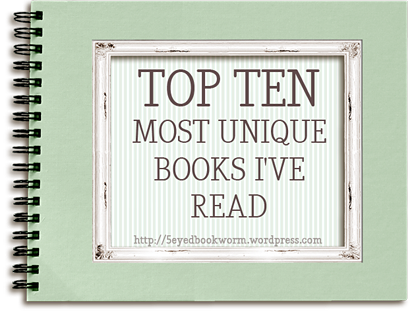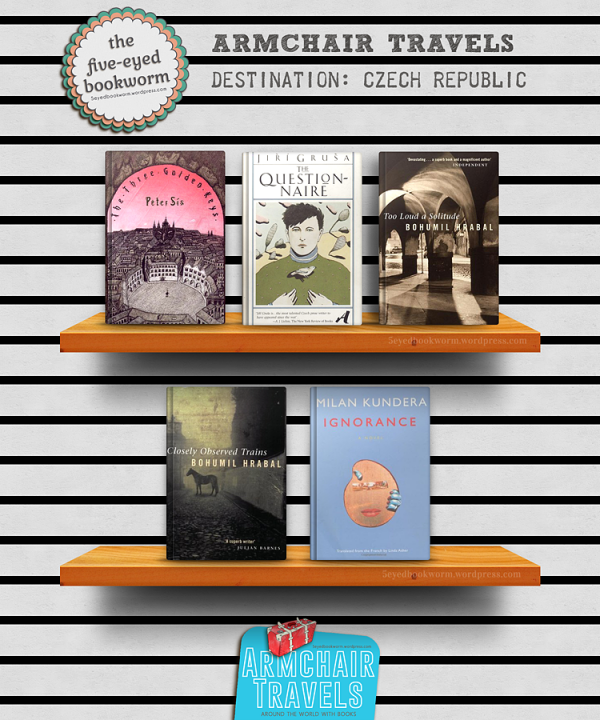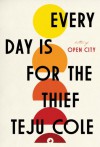Notable Quotes from The Guernsey Literary and Potato Peel Pie Society
Here are five of my favorite quotes from The Guernsey Literary and Potato Peel Pie Society by Mary Ann Shaffer and Annie Barrows. I enjoyed reading this book a lot! 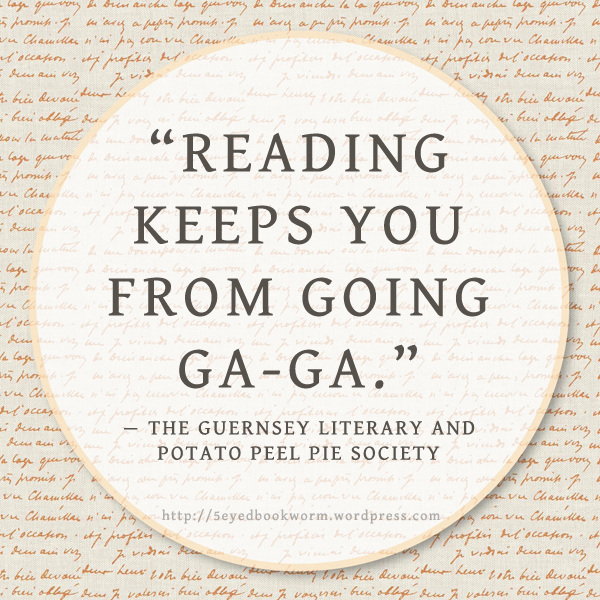
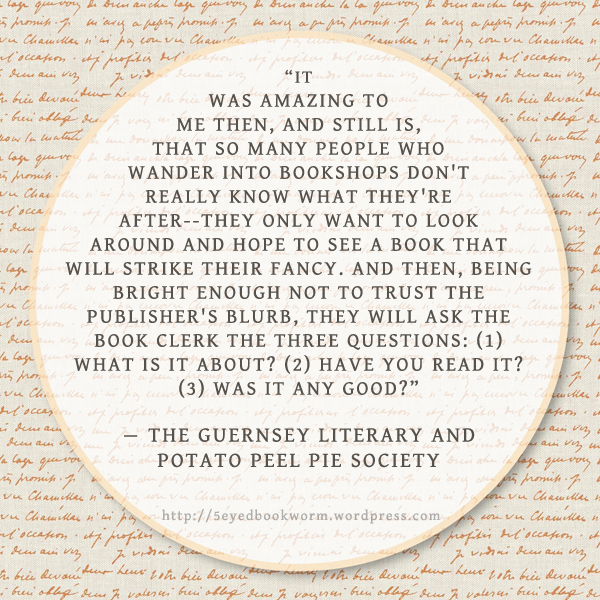

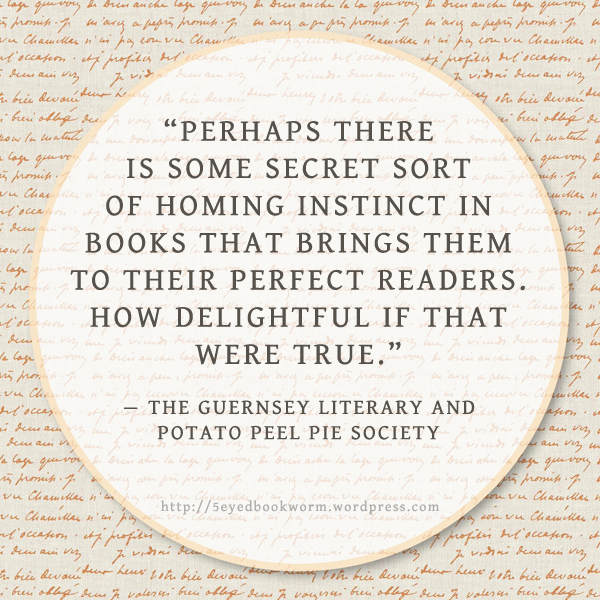
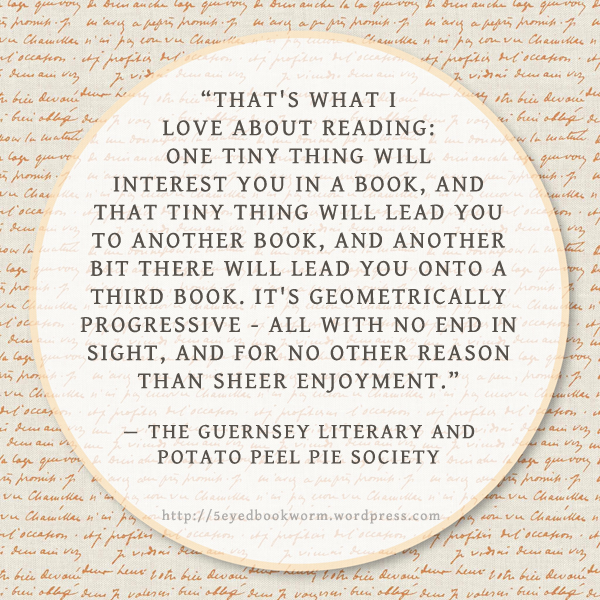 Have you read it, by any chance? I'd love to know what you thought about it. Do you have any favorite quote from the book that you would like to share?
Have you read it, by any chance? I'd love to know what you thought about it. Do you have any favorite quote from the book that you would like to share?
Connect with me:
Books set in the Czech Republic. Read this post in my blog.
Watchmen by Alan Moore
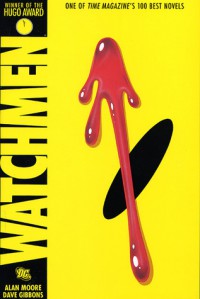
Watchmen
Writer: Alan Moore | Illustrator: Dave Gibbons | Colorist: John Higgins
Setting: New York City, 1985
Genre: Comics & Graphic Novels
Published by DC Comics
Hugo Award (1988) | Named one of TIME Magazine’s 100 Best Novels
The strength of Watchmen as a graphic novel lies not only in its great illustrations and story, but also of its treatment of masked crusaders and superheroes. This graphic novel did not aim to glorify their presence in the world. It focused on the dissection and deconstruction of masked heroes and superheroes, as well as the exploration of the paradoxes of their existence and purpose. Obviously there is a distinction between superheroes and masked ones, the latter as vulnerable as all of us, but possess the right skills and perhaps intuition to fight the bad guys. There’s something visceral and profound in the exploration of these lives. They are driven to defend people but also need to deal with their own lives and relationships. They are human after all – they may evoke power but they also have their flaws. Such complexities and quandaries abound not only in the characters but the events that transpire within the graphic novel. There are stories within stories, philosophical at times and full of symbolism. This is what makes it so deep and dense. I found myself going back to some pages to fully assimilate what is being said and where the story is going to.
There is also the dilemma everyone is facing, whether they are superheroes or ordinary people. Commentaries are not given sparsely. There is Rorschach’s psychiatrist and a newspaper vendor that lends more depth to the entire story by giving us their own observations not only of the characters but the world they live in. They give us an insight into the characters’ minds, revealing their reality and struggles while also discussing the more weighty subjects like war, child abuse and violence. Their voices ground you to the nature of being human just as much as the masked heroes’ lives.
Watchmen is a very complex and compelling story, well worth a second or even a third read. This graphic novel broke grounds when it was released and it deserves all of its accolades.
Should you read it?
“I’ll leave it entirely in your hands“
Full review in my blog
 1
1
Ring by Koji Suzuki

Ring (Ring Series, Book 1)
Author: Koji Suzuki
Translated by Robert B. Rohmer and Glynne Walley
A last minute decision forever alters the life of Kazuyuki Asakawa in this gripping story about a video of incongruous images delivering a death threat to the viewer. Four mysterious deaths in Tokyo, which are thought to be connected, piques the interest of Asawaka, a journalist. This is a race against time to solve the mysteries of the videotape.
It’s been quite a long time since I read any book from the horror genre. Reading this book reminded me of those days when I enjoyed watching horror movies all by myself, much to my mother’s wonder. Watching horror movies by myself wasn’t a choice, just in case you’re wondering. Whenever I suggested that we watch a horror flick, no one in the family was really interested (even when I’ve prepared the usual popcorn and drinks) so I’m left sweating and shivering alone.
Remember those times when the products of your imagination- something you can’t see, terrified you? Well, Ring did not fail to reawaken those old feelings of instinctual terror.
From the first few pages of the book, one becomes aware of an unsettling presence. A strange feeling engulfs you and when you try to shake it off, you just can’t. There is a terrific connection between metaphysical horror and unreality. Since this is a race against time, one can’t help but sense an impending catastrophe waiting to happen.
The videotape’s message of impending death would definitely terrify anyone. Some might dismiss this as a hoax, but of course, one can’t take any chances. Asakawa enlists his friend Ryuji’s help. Understandably, Asakawa grows increasingly wary, petulant and distraught as the seventh day nears.
As Asakawa strives to counter the videotapes curse he is also faced with a dilemma, for when he chooses to show this to anyone, that person might end up dead after seven days too. When Ryuji agrees to help, Asakawa can’t help but admire Ryuji’s courage. Not only that, Ryuji proves to be the deus ex machina throughout the novel. He steadily utilizes his connections and shows his brilliance throughout the novel. One can’t discount the fact that despite Ryuji’s peculiar character, he is loyal to his friend and dedicated, just as Asakawa is, to solve the mystery behind the videotape and avert an impending disaster. Every little success they encounter into unfolding the secrets of the videotape gives the reader a sense of relief but it is never complete and merely fleeting.
One of the strongest points of this dark and compelling book is the almost tangible and perceptible sense of sinister evil permeating the story. What is so scary is that the object of fear isn’t a physical being but rather an invisible entity that terrifies because of its unreality and ‘absence’ in the story.
The book touches on themes about metaphysical horrors that might be easily dismissed as preposterous. I would agree that the book is a concoction of somewhat fantastical and absurd elements but the writing is very convincing, so much so that the story becomes slightly plausible and even conceivable to even the most craven readers out there. If one expects bloodshed in this book then you are wrong. It is a very clever story, not the usual blood and gore you might expect from a horror book. The book expects you to maximize your imagination while it constantly spurns out the twists and turns that make this book so thrilling. The interest for the story never lags and it’s surprisingly stimulating. That’s saying a lot. I’ve read the usual horror books which weren’t very stimulating imagination wise, thanks to the lurid descriptions of horrifying events. This book expects you to use the most of your mental faculties. Not knowing what you are afraid of amplifies your imagination indeed.
Another thing worth sharing is the book’s striking stance to impress upon us the vastness of facts relating to the paranormal and subjects concerning clairvoyance or ESP. The author offered these facts with clarity, perhaps not to be believed immediately, but to aid a reader in swallowing much of the difficult paranormal stuff the book presented.
The author also didn’t fail to develop characters that we can sympathize with. The characters are distinct, never set aside and belittled despite the weighty subjects of the book. Their vulnerabilities and fears transfer to your own world making you aware of your own vulnerabilities.
I have left out a great deal of the story deliberately, but only to ensure a future reader of the experience of suspense and thrills this book has to offer. I assure you, there are many of those surprising details that will keep you on the edge of your seat.
A terrifying and suspenseful book about evil and horrors that are way beyond our comprehension. Expect a lot of twists and turns, and an ending that might surprise even the most avid fan of the horror genre.
The Diving Pool by Yoko Ogawa

The Diving Pool
Author: Yokō Ogawa
Translated from the Japanese by Stephen Snyder
In Yokō Ogawa’s first major English translation, three stories present a brutally honest and fearless picture of obsession and desire. A cursory glance at the everyday lives of the characters presents the startling possibilities of cruelty and obsession. Through her discerning writing, we begin to question our presumptions about the connections we have and the motivations behind people’s actions. The mysteries of the human psyche lure you into a world of vague arbitrary signs that when deciphered can change your views completely.
In the title story The Diving Pool, we meet Aya who lives in an orphan house managed by her parents. Since she is the only one who is not an orphan there, she feels detached and alienated. The voice Aya has is a combination of innocence, coming-of-age and brutal cruelty. In an impulsive act, without any kind of motivation or reason whatsoever (at least, that’s what I think), she starts to abuse a baby in the orphanage. The baby’s cries give her pleasure and inspires a satisfaction that seems morbid and downright disturbing. Paired with this sick behavior is her obsession with another orphan Jun. She watches him during diving practice, noting his body and movements with utmost fascination.
The second story Pregnancy Diary is my least favorite but it’s as disturbing as the other stories in the book. The narrator records the progress of her sister’s pregnancy and also describes the various discomforts her sister feels. While the story moves on one can sense the narrator’s desire to create some sort of havoc that will alter the lives of not only her sister but of the baby as well.
Dormitory, the third story, is about a woman who goes back to her old dormitory which is run by an old man who has no arms and only one leg. For me this story had the most potential but the ending left me confused, unsatisfied and disappointed. Despite this, it remains my favorite of the three.
The Diving Pool is a realization that violence and cruelty can exist even in the most quiet way. The characters seem to share a common way of dealing with their negative emotions: real things are left unsaid and never thought of. It’s as if they were afraid of their own words and thoughts. The desire to cause harm to others are merely implied and never said outright as if the characters are aware that we are silently scrutinizing them. I wonder if the isolation shared by the characters warrant an ounce of sympathy from the readers of this book.
What struck me most is the capability of people to hide what they mean under the guise of somewhat innocent acts and language. While the straightforward nature of Yokō Ogawa’s prose drew me in inexplicably, considering the disturbing tones underlining each story, it still strikes me as beguiling that her simplicity of words can unsettle me. She easily exploits our familiarity and views about relationships, carefully leading us into the dark depths of suppressed emotions. She seems determined not to permit her characters to state bluntly what they are planning to do. Yokō Ogawa creates this innate tension that further confirms that there is always a possibility of cruelty and brutality hidden under manners and words.
There’s something tormenting and consuming about unspoken words and hidden motives. As the words and motives of the characters start to make sense in Yokō Ogawa’s The Diving Pool there is a stubborn sense of anticipation that motivates you to turn the pages.
The Diving Pool is an undeniable medley of beauty and darkness, paired with the simple and unrelenting writing of Yokō Ogawa. The conclusions of each story are entirely arbitrary, but the book’s entirety and its honesty will linger in the memory.
The Giver by Lois Lowry

The Giver
Author: Lois Lowry
Winner of the Regina Medal (1994) | Winner of the Newbery Medal (1994) | Winner of the William Allen White Award (1996)
Much of our decisions mold our lives into certain shapes. Some are forged with strength and without traces of doubt; while some can be ugly- figures so deformed they evoke the usual dread and regret brought about by badly-made decisions. But imagine a world that doesn’t dwell on individual choices, where everything is programmed to perfection, where everything is under control, where every need is provided for, and where anguish, fear, war and hunger are not known.
Jonas is a resident of such a world. He lives in a community where roles are designated by elders based on an individual’s skills. This is a community who thrives without feelings, love and individuality. The world where Jonas lives in is robotic, fabricated and colorless. Everything is the same. Everything is so boring. Stuffed animals are objects of comfort. A front-buttoned jacket symbolizes the first signs of independence. Pills that suppress emotional desire, also called as “stirrings”, exemplify the need to subdue feelings. The demands imposed for precision of language and implicit acceptance of rules are not met with objections. It is as simple and as ‘perfect’ as that. There are no colors, no real memories and no love. The residents living in Jonas’ community have their lives created for them, without any meaning and purpose. Their existence is simply a mere fact and a lie.
One thing that’s really interesting in the book is the community’s concept of love. According to Jonas’ mother, the word love has no meaning. This was explained to him when Jonas asked his parents if they loved him. Of course, in the world we live in, when someone asks you if you love them, that would either be a yes or no. In Jonas’ world however, love is insignificant. It made me feel uneasy because while the concept of love in modern society is usually confined to relationships we have, we also know of an adage that tells us that love makes the world go round. I don’t care how cliché that might sound, but it’s true isn’t it? So what’s keeping Jonas’ family and community together then?
The practice of euthanasia (“Release”) in Jonas’ community is accepted. Usually ordered for the elderly, weak newborns, and for punishment in Jonas’ community, “Release” is just another vague and unquestioned rule. Of course, in our society today, concerns about the morality and legality of the practice of euthanasia are largely debated.
Every year, a ceremony is held for each age group. At twelve years old, children are assigned a specific role. Jonas’ was chosen as the next Giver. It is an honorable role in the community, until Jonas himself experiences what this task demands from him. Only the Giver in the community is allowed to have real emotions, whether they are good or bad. He is the keeper of memories. As Jonas begins his training, he is perplexed by the multitude of emotions passed to him by The Giver. Horrific wars, unbearable pain and hunger, and sorrowful deaths threaten to consume Jonas’ mind. Yet the memories passed to him about belonging, uniqueness and love comfort him immensely. When The Giver gave him memories, Jonas was able to perceive new words and feel emotions. He also starts to question the basis of his community. Why have they accepted “Sameness” and relinquished all these memories? Why are the people in the community not allowed to feel or decide? Jonas begins to realize then that while the community presents a perfect façade, it is also plagued by the cloaks of denial and suppressed emotions.
While most of his friends are free to discuss their training with anyone, Jonas wasn’t permitted to do so. Suddenly, there was a part of life he can no longer share with his family. This makes him lonely, frustrated and detached from his family and friends. Imagine not being able to share the grandeur and hues of a beautiful sunset, or the refreshingly vivid colors of flowers. Now that he knows the variety of emotions everyone in his community is ignorant about, he starts to understand its significance. The memories and feelings passed on to him are not merely facts for Jonas now but more of an acceptance of the real world. He now knows that whatever his community is allowed to ‘feel’ is shallow compared to what he is now capable of feeling. This renewed sense of living a real life compels Jonas to make a difficult decision towards the end of the book. While feelings of hope invade him- that somewhere there is a place where people can live with decisions, feelings and memories without prohibition, Jonas is now forced for the first time to make a decision. This decision, like any other, has untold consequences, gripping Jonas with fear and apprehension.
A lot of people have questioned the book’s ending (or lack thereof). I didn’t find this a large issue. I definitely saw it as the reader’s freedom to interpret what happened to Jonas in the end. With that in mind, I want to think that Jonas had a happy ending. Surely the wisdom passed on to him will be of use to many, including him. I would like to think that Jonas defeated the world he lived in by making that decision in the end.
This book is among the most frequently challenged books of our time. While I do understand parent’s concerns about the issues presented in this book (as with other banned books), simply ignoring these issues are just as bad. I believe that information and guidance is key whenever difficult issues are presented to children, be it from books or movies or television shows. Information, so as to allow the presentation of facts and concerns. Guidance, so as to allow a parent to discuss it with their child and guide them through the discovery of those facts. It’s ironic that a book that tries to defeat a world where freedom of choice is absent, can be banned because of the opinions of others.
The Giver is a compelling read. I enjoyed reading it very much. The new life of Jonas, now filled with memories of the past and the enormity of the feelings humans are capable of, is moving and refreshing. The comforting memories of simple events such as birthdays and even grandparents evoke a sense of nostalgia and deeper appreciation of these experiences. The book forces you to dig deep within your thoughts and most importantly, it teaches us the value of freedom and individuality.
New Book Releases To Check Out
- The House at the End of Hope Street: A Novel by Menna van Praag (March 25, 2014 by Penguin Books [Goodreads]
- The Cruelty by S. Bergstrom (March 15, 2014 by JKSCommunications) [Goodreads]
- Stay Where You Are And Then Leave by John Boyne (March 25, 2014 by Henry Holt and Co. (BYR)) [Goodreads]
- Byrd by Kim Church (March 18, 2014 by Dzanc Books) [Goodreads]
- Every Day is for the Thief by Teju Cole (March 25, 2014 by Random House) [Goodreads]
- Riding a Crocodile by Paul A Komesaroff (March 11, 2014 by River Grove Books) [Goodreads]
The Isle of Youth by Laura van den Berg

Title: The Isle of Youth
Author: Laura van den Berg
Genre: Short Stories
Setting: Argentina • France • Cuba • USA
Design by Abby Kagan
Publisher: FSG Originals (November 5, 2013)
Literary Awards: Amazon Best Book of the Month (November 2013) | Won the Rosenthal Family Foundation Award from the American Academy of Arts & Letters (others)
Laura van den Berg has created an original, smart and engaging piece of work with The Isle of Youth. It evoked haunting thoughts about our connections with others and the struggle to find ourselves. While all these stories are about women trying to grapple with their own difficult and complex circumstances, each story stands on its own. At times strange, mysterious, and unsettling, the stories draw you in without any ounce of demand or coercion. The stories were written with admirable brevity and you can’t help but read them. My favorite stories from the book were Antarctica, Lessons and the title story, The Isle of Youth.
The women in The Isle of Youth have experienced abandonment in its different guises, but each character and story remains distinct. They long to connect with their loved ones, but everyone seems to be leaving them and asking them to move on as well. We either get the sense that they are trying to escape their loneliness while struggling to move on, or they have resigned themselves to their fate, not wanting to do more. When an opportunity shows, they become impulsive and act upon it without much further thought. Some of their decisions border on the ludicrous at times. One can’t help but feel that these decisions will cause them more harm unless someone intervenes. These characters seem to be trapped in their lives and relationships. Personally, I didn’t consider them to be thoroughly likeable, although their stories allowed me to sympathize with them.
There is this sense of incompleteness in the stories, seemingly juxtaposed with the characters’ own emptiness and desire for something more. While the endings are uncertain, it doesn’t mean they are unconvincing. The vagueness of how each story ends serves not only to mimic the uncertainty each character faces as they move along with their lives, but also perfectly mirror their imperfections and indecisiveness. It just shows that we never know what’s coming.
People say Laura van den Berg is one of the great new writers we have today… I can’t agree more. Her writing is smart, energetic and sophisticated. Each of the stories in The Isle of Youth left me affected. In this book, I came face to face with my own vulnerabilities. The ambiguity of the women’s situation is a stark contrast to the author’s simple, straightforward, and unadorned writing. The clarity and simplicity of it all is one of the things I adored in this book. The stories seem familiar, but the depth and complexity of these great stories will no doubt stay with me. This is the first book of short stories I’ve read in my adult life, and the first book written by Laura van den Berg that I’ve read. I don’t think I could have picked a more perfect book of short stories to read. I am definitely looking forward to her next book. Highly recommended.
Flora and Ulysses: The Illuminated Adventures by Kate Di Camillo
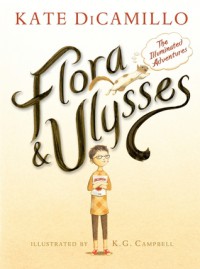
Flora and Ulysses: The Illuminated Adventures
Author: Kate DiCamillo
Illustrated by: K.G. Campbell
Genre: Children’s Books > Middle Grade
Published September 24th 2013 by Candlewick Press
Winner of the 2014 Newbery Medal
Who knew a certain Ulysses Super-Suction Multi-Terrain 2000X vacuum cleaner can impart super powers and poetry writing prowess to a squirrel? Exactly! Who knew? But what a fantastic start to a veritable action-packed story featuring endearing characters, humor, not-so-common adventures, and witty dialogue.
Flora, our heroine is a cynic, hates romance and is a comic book junkie. The story starts with Flora witnessing a squirrel getting sucked into a rather huge vacuum cleaner given as a gift to Tootie Tickham, Flora's neighbor. The squirrel lives, thanks to Flora's lifesaving action which she learned from a bonus comic book (called Terrible Things Can Happen To You!) at the back of every issue of The Illuminated Adventures of the Amazing Incandesto. The squirrel did not waste time showing its super powers, surprising Flora and Tootie (even yours truly). Convinced that the squirrel possessed super powers, Flora brings him home and aptly calls him Ulysses. And you know what inevitably comes next when we're talking about superheroes - adventure, an arch-nemesis and poetry. Somehow the incident with the vacuum has also given Ulysses the capacity to write poetry (makes me want to get sucked into a vacuum myself), has made him think of other things besides food, and also gave him the capacity to be profound and reflective of his world- "When did things become so beautiful? And if it has been this way all along, how is it that I never noticed before?" An unexpected arch-nemesis threatens to separate Flora and Ulysses and that's where their adventures begin.
While the story itself was inventive and outstanding, the appeal of Flora and Ulysses lies in the characters. They are perky, unconventional, bright, witty and brave. One of my favorite characters from the book (aside from Flora and Ulysses, of course) is William Spiver. This little guy knew his way with words and he is not afraid to admit it- "I must admit that I have always had a certain facility with words. And I am terribly fond of the novel form. Though my interests lie less in the area of romance and more in the speculative nature of things. Science fiction, if you will. Fact blended in fantasy, an extended meditation on the nature of the universe." Ha! Adorable.

The brilliant black-and-white illustrations by K.G. Campbell and Kate DiCamillo's writing provides us with a medley of beautiful art and words. The illustrations perfectly enhance the narrative. While the illustrations are in black and white, K.G. Campbell truly has the ability to show emotion (even gesticulations) through her drawings. The use of comic book panels in the illustrations, of course, is a much talked-about feature of the book. The use of these elements in a children's book is believed to be ground-breaking. But the books appeal doesn't stop there. The essence and heart of the story is love, depicted in different ways and levels. I was surprised by how much the characters' experiences and relationships portray a deep message of forgiveness and love. This book makes you want to believe and hope. Yes, even if our heroine is a self-confessed cynic.
Before reading this book I told myself that I'm going to shed any skepticism, obliterate any cynical cell within and just enjoy the story. When I was younger, I remember one of my teachers telling us about the difference between being childish and being child-like. The latter was much more desired. Needless to say, the book did not fail to awaken that child-like wonder in me. Reading this story reminded me of my younger days, traversing magical worlds and meeting implausible characters through books. I loved that familiar sting of excitement and wonder that we so often 'misplace' as we grow older. It's a wonderful thing when a book gives you the opportunity to relish the wonders of the impossible and for making you believe.
Flora and Ulysses is an immensely enjoyable read. It's an engaging, original and heartwarming tale of love, friendship and family. The writing is beautiful. The characters themselves lend an emotional depth to the story. If you're going to read a children's book this year, make it this one.
Blankets by Craig Thompson

Blankets
Author/Illustrator: Craig Thompson
Published by Top Shelf Productions
Setting: Wisconsin, United States
Genre: Graphic novel, Memoir/Autobiography
Literary Awards: Harvey Award for Best Artist (2004) | Will Eisner Comic Industry Awards for Best Graphic Album–New (2004) | #1 in Time Magazine’s 2003 Best Comics list | #8 in Time Magazine’s Best Comics of the Decade | 2004 Harvey Award for Best Artist, Best Cartoonist, and Best Graphic Album of Original Work | 2004 Eisner Award for Best Graphic Album and Best Writer/Artist | 2004 Ignatz Award for Outstanding Artist and Graphic Novel or Collection
Blankets is a compulsively readable graphic novel that recounts certain stages of Craig Thompson’s life. Woven into all the illustrations and stories is a very compelling look at the formative experiences of the author. It is an exploration of childhood and growing up, being in love for the first time, and relationships within the family. It also explores the various struggles (emotional and spiritual) and obstacles Craig has to deal with. At its core is the powerful message of family, love, hope and liberation.
What makes this graphic novel endearing and close to my heart is the humanity of its characters and the ability of the book to remind you of your own childhood. I found it fascinating how a book can allow you to enter a mind or an intimate universe merely because of its existence. There’s something tempting about learning how another person’s experience reflect your own. Blankets shows how life can have baffling contradictions and how our past molds us into our future self. The echoes of the past certainly won’t cease. Rather, they become reminders, lessons and poignant memories. Craig’s story embodies almost every experience we had when we were younger- our squabbles with our siblings, our complex relationships with our parents and friends, and even our struggles to find our own path in life. His insights about faith and relationships, while intimately his, are just some of the things I suddenly wanted to think about. It was absolutely fascinating to find Craig’s experiences identifiable. The stories within the book make you realize how vulnerable you are even if you constantly affirm that you can take care of yourself. His depictions of life within the confines of his home and Raina’s family evoked certain emotions in me – sadness, compassion, empathy and perhaps even pity for Craig, but it was also heartwarming and hopeful.
Craig Thompson has successfully demonstrated that his personal accounts and memories could be rendered in graphic novel form, relating a tale of growing up while using amazingly detailed black-and-white illustrations. One would sense his use of visual metaphor all throughout the book. He uses black-and-white illustrations to complement his words. He uses symbols to help us make sense of Craig’s experiences and thoughts, and how this has molded him into who he is. I also noticed the author’s use of snow as a metaphor not only of beginnings or renewal, but also of isolation and endings. The blankets mentioned or seen in the book become a symbol of comfort, affection and togetherness. The quilted blanket Raina gives Craig symbolizes the patterns and contrasts we experience in life. The use of symbols in the author’s amazing and detailed illustrations coupled with the veracity of the story gives power to the book’s message.
Audacious, heartfelt and beautiful, Blankets has won me over. It’s a poignant reminder of our own childhood and how moving forward is essential in life. The humanness of the characters and stories become the attractions without discounting the brilliance of the illustrations. I would like to think that this graphic novel will erase all the doubts that certain people have about the potentials of this genre. I think it’s great that the author used this medium to portray his life. It was an absolutely great read. Highly recommended.
>> READ THE REVIEW in my blog.
>> READ NOTABLE QUOTES in my blog.
Enduring Love by Ian McEwan

Enduring Love
Author: Ian McEwan
Genres: British Literature, Contemporary Fiction
Setting: United Kingdom
James Tait Black Memorial Prize Nominee for Fiction (1997)
I have never experienced reading a book that immediately filled me with a sense of foreboding. The beginning chapter of Ian McEwan’s Enduring Love was arresting and thrilling. It starts off pretty innocently: two lovers having a picnic in an idyllic setting. Then the story makes a complete 180-degree turn. What started off as a beautiful and calm day ends up in tragedy. A hot air balloon appears in the sky, obviously in trouble as the wind’s implacable strength raises the balloon up and tosses it around. A man is being dragged with it and a boy is inside the basket. Several men, including Joe Rose, try to hold the balloon down but to no avail. You know something bad will happen and it did. A man dies in his efforts to save someone. This prelude to the novel becomes an uncompromising element for the grim things to come. One of the men who tried to help was Jed Parry. That chance encounter between the Joe and Jed gives birth to a delusional attachment and obsession that will prove destructive not only to Joe but also in his relationship with his wife, Clarissa. Life can change in an instant indeed.
Jed Parry suffers from de Clerambault’s syndrome or erotomania. Someone who suffers from erotomania fervently believes that someone is in love with him/her.
Erotomania is a type of delusion in which the affected person believes that another person, usually a stranger, high-status or famous person, is in love with him or her. The illness often occurs during psychosis, especially in patients with schizophrenia, delusional disorder or bipolar mania.[1] During an erotomanic episode, the patient believes that a secret admirer is declaring his or her affection to the patient, often by special glances, signals, telepathy, or messages through the media. Usually the patient then returns the perceived affection by means of letters, phone calls, gifts, and visits to the unwitting recipient. Even though these advances are unexpected and often unwanted, any denial of affection by the object of this delusional love is dismissed by the patient as a ploy to conceal the forbidden love from the rest of the world. (Source)
His delusions are coupled with personal religious beliefs that are overly zealous. In a series of letters, Jed tells Joe how inevitable their meeting was and how they were meant to be with each other. Aside from Jed’s affections and delusional beliefs about Joe’s motives, Jed also tries to convince Joe to turn to God. Jed becomes a rather frightening entity in the story not because he was violent but because his presence becomes constantly disturbing. He starts to stalk Joe, calls him regularly and writes him letters. He doesn’t yield even if Joe dismisses him. We later find out what stalking and obsession can do to people – how it destroys their lives and even their relations with their loved ones. Joe Rose who has rationalized his way into his many written science articles suddenly feels trapped and confused. He is scared for his life as well as Clarissa’s. The book calls your attention to the dark and haunted mind of a disturbed man. Jed looks rather pitiful and harmless but when you read his letters to Joe, you feel uneasy. You can’t help but expect Jed to turn violent as Joe tries to ignore and avoid him. You keep asking questions. You keep anticipating that worse things will happen. And that’s the genius behind this book – you never know where the story is headed.
That the plot should be drawn out so well and the complexities of the characters be portrayed with beautiful writing is a tribute to the author, Ian McEwan. There are some scientific discussions within the book but it never felt boring or monotonous. He has the uncanny way of making the complex understandable and he wrote these things beautifully. They were quite interesting actually but a little disorienting. Not to blame the author, but perhaps my own mind was at fault. There were some things I absorbed immediately but there were some that I had to re-read in order to grasp what was being said. Surely the author can’t be faulted as many of his works have been praised countless times.
Enduring Love spews ambiguities and contradictions, and gives you an impression of a reality that is undoubtedly twisted, yet Ian McEwan has the ability to use words to portray a tale of haunting qualities that intermingles with the complexities of the characters’ circumstances and the normality of their lives. It is a gripping and utterly riveting book that will make you want to keep turning pages and will keep you guessing until the end.
>> READ THIS REVIEW in my blog
>> READ NOTABLE QUOTES - Coming soon in my blog
The Curiosity by Stephen P. Kiernan

The Curiosity
Author: Stephen P. Kiernan
Genre: Science Fiction
Setting: Boston, USA | Thule, Greenland | Alert, Nunavut, Canada | Queen Elizabeth Islands, Canada
Published by William Morrow (An imprint of HarperCollins Publishers)
Mankind’s desire to answer the questions life invariably poses is usually fueled by wonder and curiosity. Much of what we know were born from the hard work and dedication of those who sought answers to simple questions. The knowledge humanity possesses now has brought forth advances that many people from centuries ago would not have imagined. While many discoveries have proven beneficial, some products of scientific discoveries have contributed to destruction and even the loss of lives. The Curiosity, Stephen P. Kiernan’s debut novel, tackles the fine line between the brilliance of scientific discovery and the ethical dilemmas we face in our pursuit of knowledge. For the novel though, the biggest question is: “What if we have the means to make death temporary?”
An expedition to the Arctic headed by Dr. Kate Philo leads to the discovery of a human frozen in an iceberg- a discovery that undoubtedly surprised and enthralled not only the scientific community but the whole world. Utilizing a scientific procedure called ‘reanimation’ the team of scientists successfully revives the frozen man (Jeremiah Rice). This success did not go unnoticed. The project was initially met with praise, but not everyone was thrilled. It was later met with skepticism, controversy, anger and protests. Surely a discovery of this magnitude will have moral implications. Those involved were even accused of playing God. Inevitably, Jeremiah Rice became a reluctant celebrity overnight and his very existence triggers a series of events that will change the lives of all those involved in the project.
The Curiosity was an engrossing read right from the start. The story revolved around the science of cryogenics, the individuals involved, and the assimilation of Jeremiah Rice into modern society. The realm of science fiction often turn people off (including me, sometimes), for many reasons, but The Curiosity makes for one readable science fiction book simply because it was handled and written well. Mr. Kiernan did a great job in carefully pacing the story and melding a variety of themes together. The extraordinary has somewhat become convincing, while never touching the edges of absurdity. The story is told with shifting perspectives and allowed the characters to present themselves through their inner dialogues. There are some deeply moving lines in the story especially from Jeremiah Rice but my favorites were his hilarious commentary about body piercing, camera phones and supermarkets, just to name a few. Once I started it was hard to put down.
Perhaps the greatest strength of the book lies within its believable and interesting characters. While some are extraordinary in their own ways, some are downright despicable. It is a perfect mix of brilliant minds, compassionate individuals, and obnoxious and sleazy characters. It’s no surprise that I found Jeremiah Rice to be the most endearing character. He is a man radiating with wisdom and integrity. His opinions about our modern world resonated with me.
Many underlying themes are incorporated in the book as well. While a large part of the narrative delved into science and the lives of those involved, it also explored relevant subjects such as ethics, religion, and the role of media in our society. In the novel, the author showed how influential and powerful the media is- it can twist facts and make people believe if it wants to. The book is never preachy though, and that’s the beauty of it. The author actually dares you to analyze these themes without imposing his own beliefs.
My disappointment lies in the ending. I usually don’t have any problems with ‘hanging’ endings because it leaves room for limitless interpretations, but for this story, I wanted something concrete and believable (unless there’s a sequel). It’s a subjective (and minor) flaw, of course. Some people might not find this too much of a problem.
The Curiosity by Stephen P. Kiernan is not your typical science fiction novel. It is a well-rounded and brilliant debut novel denying blunt categorization. Blending science, romance, suspense and drama, this book has underlying themes that will appeal to almost everyone. I enjoyed reading this a lot. I would gladly recommend this to book clubs and to individuals organizing readalongs as it has a lot of issues fit for discussion. Readers who find great pleasure in reading books that are thought-provoking will be pleased.
This book left me with a sense of life’s promises and paradoxes, while also confronting me with questions about what it means to truly exist in this world and how to lead a purposeful life. It also leaves a question for all of us to think about: “What are we willing to sacrifice in the name of science and discovery?”
>> READ MY REVIEW of this book in my blog (plus facts about the actor and book)
>> READ NOTABLE QUOTES from this book in my blog
Soy Sauce for Beginners by Kirstin Chen
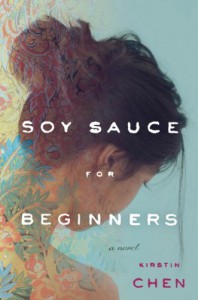
Soy Sauce for Beginners
Author: Kirstin Chen
Cover Design: Lynn Buckley
Genre: Contemporary Fiction, Women’s Fiction, Chick Lit
Setting: San Francisco, USA | Singapore
Published by New Harvest
Thirty-year-old Gretchen Lin leaves San Francisco to return to Singapore. She aims to break away from the hurt and shame caused by her American husband’s infidelity, but going back to her homeland meant she also has to face the ‘subtle’ demands of her family to involve herself in the family’s artisanal soy sauce business, as well as her mother’s failing health and alcoholism. Instead of opening up to her friends back in Singapore, she tries to avoid them and also attempts to isolate herself from her family. Her complacency becomes a rather overused attitude that simply leads her to nowhere and into more trouble.
What’s great about Gretchen’s character is that her issues are universal- her struggle to come to terms with her husband’s infidelity and the shame that goes along with it, the demands and pressures of family businesses, having the courage to settle things between her own need to be loved and to be understood while providing her parents much-needed support. She seems halfhearted and indecisive about how she can resolve things so she can become an individual in her own right. I found Gretchen to be authentic and honest, dealing with common issues that many can relate to. Her speech and thoughts were identifiable and realistic. She is struggling to find her purpose and find her place in the world. One would sense that Gretchen seems to know more about the soy sauce business than she would actually admit. Her constant denial of her loyalty to their family’s business becomes rather pointless. She knows she has been honed to be part of it since she was little. Her belief in quality coincides with her father and grandfather’s dedication to producing great quality soy sauce, prepared using traditional methods. In the end, she redeems herself by making difficult choices and dealing with her problems head on.
Reading this book brought back fond memories of living in Singapore. It mentioned a lot of places I’ve been to and food that I enjoyed (and dreamed of). I love how she easily incorporates some Singlish (“Singapore’s unofficial tongue”, according to the author) in the book. You can learn more about Singlish here. I remember speaking Singlish when I was still living there. Words like lah, aiyah and hor were something I picked up from my Singaporean friends and classmates. During my last visit in 2011, I was surprised that I have retained the language and still had the intonation and vocabulary to converse with many people this way. It was truly wonderful to remember these moments while reading Gretchen’s story.
I was surprised with the alacrity at which I read this book. I found myself wanting to know what will happen next. I was completely drawn to the story and eagerly awaited Gretchen’s next move. Kirstin Chen’s writing is lucid. Its brevity doesn’t dampen the story. It does the opposite actually… It lends a sense of lightheartedness and frankness that I found refreshing. I loved the premise of finding your true calling in a world that serves to confuse and challenge at times. Realizing that we need to face problems instead of running away is a point that was realized through Gretchen’s experiences. I found comfort in the reassuring message of love and support from family. Sometimes the people we love are the ones we never run to when we despair. It’s great to know then that no matter how many times we mess up, loved ones will always be there for us. Family is not merely a word but rather a place we can call home and find unconditional love.
Soy Sauce for Beginners is a window into the rich culture of Singapore, Chinese cuisine and the art of artisan soy making. Those who find interest in these things will not be disappointed. If you’re looking for a quick and enjoyable read about a new culture and exotic food, look no further.
>> READ NOTABLE QUOTES from the book
>> VIEW THIS REVIEW in my blog
Mind MGMT, Vol.1: The Manager by Matt Kindt

Mind MGMT, Volume 1: The Manager
Writer/ Artist/ Cover Artist: Matt Kindt
Genre: Comics & Graphic Novels • Science Fiction • Action & Adventure
Setting: USA • Mexico • China • Baghdad, Iraq • Tanzania
Published April 2013 by Dark Horse | Collects MIND MGMT #1-#6
Literary Awards: iBooks Best of 2013 (accomplished graphic novels) • YALSA Great Graphic Novels for Teens (Top Ten) (2014)
Synopsis: Reporting on a commercial flight where everyone aboard lost their memories, a young journalist stumbles onto a much bigger story, the top-secret Mind Management program. Her ensuing journey involves weaponized psychics, hypnotic advertising, talking dolphins, and seemingly immortal pursuers, as she attempts to find the flight’s missing passenger, the man who was MIND MGMT’s greatest success—and its most devastating failure. But in a world where people can rewrite reality itself, can she trust anything she sees? (Darkhorse Comics Website)
If I can describe this book in one sentence, it would be: The action never ends.
Matt Kindt must have a very fluid and exceptionally vivid imagination to come up with Mind MGMT. It explores a lot of things ranging from clairvoyance, telekinesis, espionage, action, adventure, and mystery, but it’s done so well. At the core of this fantastic story is the complex and elaborate riddles the author has presented about Mind MGMT, the premier psychic espionage organization, gradually unfolding its mysteries as the narrative moves forward. Mind MGMT presents a somewhat ghastly vision of a world where people with extraordinary and superhuman abilities walk among us, exposing us to a myriad of supernatural occurrences and mind abilities. Here’s a story that utilizes familiar themes in science fiction but has cleverly inverted them into an original and unconventional story. The result is an engrossing and compelling read that does not fail to draw you in, encouraging you to ask questions and seek answers.
The story builds superbly. At first the story seems discordant, presenting us with a narrative that doesn’t seem to add up. When we eventually discover what the story is all about, another mix of twists and turns are revealed, making us wonder where the story will lead to next. Matt Kindt has allowed this story to slowly evolve into something hypertrophied, but thrilling all the same. The facts are never completely exposed, cloaked and hidden, awaiting to be released in perfect time. While paranormal activities abound, it is surprisingly convincing. The realm of science and fantasy has been unified so strikingly that it becomes a little unnerving- brilliantly, at that.
It’s not only the story that can be deemed unconventional in comic book standards. The art work, for example, shows how Matt Kindt applied his intense creativity. A typical comic book usually presents solid, bright colors whereas Mind MGMT uses the ethereal effects of watercolor. It perfectly reflects the ambiguities and the mysteries underlying the story. I have not read a lot of comic books but this was a completely different thing for me. I think it’s safe to say that this book appeals not only to the intellect but also to the sense of sight. When I first looked at the cover, it seemed an ordinary illustration of a woman with an exposed brain, but once you get to see it in close up, you will see that the ‘brain’ is made up of people inflicting harm to one another. As with the covers that follow, these illustrations demand a second look as it has hidden visual messages.
The same riddles and complexities latch onto an array of beguiling characters we meet in the story. It occurred to me that even Meru, the true crime writer protagonist, is someone I will not fully know or understand. Somehow, I felt she has a deep connection with Henry Lyme and thus the organization itself. I am guessing all the missing links will be explained in the succeeding volumes. It’s clear from the start that Meru’s goal is not only to find Henry Lyme but to dissect the Mind MGMT organization. But why? Most importantly, how?
The most disturbing and probably the most interesting characters are the Mind MGMT agents who possess extraordinary and superhuman abilities. They can alter or manipulate reality just by their thoughts. These individuals can inflict harm and kill someone as easily as they can think of what they want for lunch. I honestly don’t know if they are all good but they seem to be. Then again, I have not made sense of a lot of things while reading the book so I guess I’ll have to read the next volume to find out. I’m wondering how all of these characters will tie together and show up as the story moves along. It’s been a great ride so far, knowing them one by one, how they are trained, who the most powerful is, what their powers are… I’m curious as to how these agents will affect Meru personally. Surely there’s something here that hasn’t been clearly stated and there will be more to discover in the next volume.
Mind MGMT is a staggering piece of work. It is evident that Mind MGMT is one-of-a-kind book that will appeal to fans of the mystery and adventure genres. If you count yourself as one, then pick this up and revel in all its complexities. If you are a fan of the X-Files TV series, then you won’t be disappointed. It was a great, intense, and fast-paced read that had me wanting more. I’m looking forward to reading the next volume.







